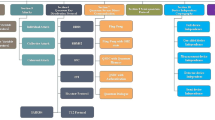Abstract
Deng et al. (J Inf Secur Appl 47:120–124, 2019) recently proposed a quantum multiparty collaborative computation protocol that claims that the private information of trustful participants is secure against the distrustful ones. They also analyzed the security of their model against a malicious user and claimed that it is secure. However, our work shows that Deng et al.’s protocol is insecure against both inside and outside attacks. We suggest a modification to prevent both inside and outside attacks from getting any useful information. Also, the proposed modified version allows all participated users to compute the final statistics instead of just one user.
Similar content being viewed by others
References
Arute, F., et al.: Quantum supremacy using a programmable superconducting processor. Nature 574(7779), 505–510 (2019)
Bennett, C.H., Brassard, G.: Quantum cryptography: public key distribution and coin tossing. Theor. Comput. Sci. 560(12), 7–11 (2014)
He, Y.-F., Ma, W.-P.: Multiparty quantum secure direct communication immune to collective noise. Quant. Inf. Process. 18(1), 4 (2019)
Huang, W.-C., et al.: Efficient travelling-mode quantum key agreement against participant’s attacks. Sci. Rep. 9(1), 1–9 (2019)
Abulkasim, H., et al.: Improving the security of quantum key agreement protocols with single photon in both polarization and spatial-mode degrees of freedom. Quant. Inf. Process. 17(11), 316 (2018)
Abulkasim, H., Alotaibi, A.: Improvement on ‘multiparty quantum key agreement with four-qubit symmetric W state.’ Int. J. Theor. Phys. 58(12), 4235–4240 (2019)
Qu, W., et al.: Multiparty ring quantum digital signatures. JOSA B 36(5), 1335–1341 (2019)
Cai, X.-Q., et al.: Cryptanalysis of multiparty quantum digital signatures. Quant. Inf. Process. 18(8), 252 (2019)
Chong-Qiang, Ye., Tian-Yu, Ye.: Circular multiparty quantum private comparison with n-level single-particle states. Int. J. Theor. Phys. 58(4), 1282–1294 (2019)
Abulkasim, H., Farouk, A., Hamad, S., Mashatan, A., Ghose, S.: Secure dynamic multiparty quantum private comparison. Sci. Rep. 9(1), 1–16 (2019)
Abulkasim, H., Alsuqaih, H.N., Hamdan, W.F., Hamad, S., Farouk, A., Mashatan, A., Ghose, S.: Improved dynamic multiparty quantum private comparison for next-generation mobile network. IEEE Access 7, 17917–17926 (2019)
Song, X., Wen, A., Gou, R.: Multiparty quantum private comparison of size relation based on single-particle states. IEEE Access 7, 142507–142514 (2019)
Abulkasim, H., et al.: Authenticated quantum secret sharing with quantum dialogue based on Bell states. Phys. Scr. 91(8), 085101 (2016)
Abulkasim, H., Hamad, S., Khalifa, A., El Bahnasy, K.: Quantum secret sharing with identity authentication based on Bell states. Int. J. Quant. Inf. 15(04), 1750023 (2017)
Abulkasim, H., Hamad, S., Elhadad, A.: Reply to Comment on ‘Authenticated quantum secret sharing with quantum dialogue based on Bell states’. Phys. Scr. 93(2), 027001 (2018)
Shi, R.-H., et al.: Secure multiparty quantum computation for summation and multiplication. Sci. Rep. 6, 19655 (2016)
Yang, H.-Y., Ye, T.-Y.: Secure multiparty quantum summation based on quantum Fourier transform. Quant. Inf. Process. 17(6), 129 (2018)
Zhang, C., et al.: Improvements on “Secure multiparty quantum summation based on quantum Fourier transform". Quant. Inf. Process. 18(11), 336 (2019)
Deng, Z., et al.: Privacy-preserving quantum multiparty computation based on circular structure. J. Inf. Secur. Appl. 4, 120–124 (2019)
Yang, Y.-G., Wen, Q.-Y.: An efficient two-party quantum private comparison protocol with decoy photons and two-photon entanglement. J. Phys. A: Math. Theor. 42(5), 055305 (2009)
Lin, J., Tseng, H.-Y., Hwang, T.: Intercept–resend attacks on Chen et al’.s quantum private comparison protocol and the improvements. Opt. Commun. 284(9), 2412–2414 (2011)
Sun, Z., et al.: New fair multiparty quantum key agreement secure against collusive attacks. Sci. Rep. 9(1), 1–8 (2019)
Cao, H., Ma, W.: Multiparty traveling-mode quantum key agreement protocols immune to collusive attack. Quant. Inf. Process. 17(9), 219 (2018)
Huang, W.-C., et al.: Designing secure quantum key agreement protocols against dishonest participants. Int. J. Theor. Phys. 58(12), 4093–4104 (2019)
Cai, Q.-Y.: Eavesdropping on the two-way quantum communication protocols with invisible photons. Phys. Lett. A 351(1–2), 23–25 (2006)
Li, X.-H., Deng, F.-G., Zhou, H.-Y.: Improving the security of secure direct communication based on the secret transmitting order of particles. Phys. Rev. A 74(5), 054302 (2006)
Deng, F.-G., et al.: Improving the security of multiparty quantum secret sharing against Trojan horse attack. Phys. Rev. A 72(4), 044302 (2005)
Lin, J., Hwang, T.: New circular quantum secret sharing for remote agents. Quantum Inf. Process. 12(1), 685–697 (2013)
Ye, T.-Y., Ye, C.-Q.: Measure-resend semi-quantum private comparison without entanglement. Int. J. Theor. Phys. 57(12), 3819–3834 (2018)
Jiang, L.-Z.: Semi-quantum private comparison based on Bell states. Quant. Inf. Process. 19(6), 1–21 (2020)
Acknowledgements
This research was funded by the Natural Sciences and Engineering Research Council of Canada and NXM Labs Inc. NXM’s autonomous security technology enables devices, including connected vehicles, to communicate securely with each other and their surroundings without human intervention while leveraging data at the edge to provide business intelligence and insights. NXM ensures data privacy and integrity by using a novel blockchain-based architecture which enables rapid and regulatory-compliant data monetization. Ryerson University is in the “Dish With One Spoon Territory.” The Dish With One Spoon is a treaty between the Anishinaabe, Mississaugas and Haudenosaunee that bound them to share the territory and protect the land. Subsequent Indigenous Nations and peoples, Europeans and all newcomers, have been invited into this treaty in the spirit of peace, friendship and respect. Wilfrid Laurier University is located on the traditional territory of the Neutral, Anishnawbe and Haudenosaunee peoples. We thank them for allowing us to conduct research on their land.
Author information
Authors and Affiliations
Corresponding author
Additional information
Publisher's Note
Springer Nature remains neutral with regard to jurisdictional claims in published maps and institutional affiliations.
Rights and permissions
About this article
Cite this article
Abulkasim, H., Mashatan, A. & Ghose, S. Security improvements for privacy-preserving quantum multiparty computation based on circular structure. Quantum Inf Process 21, 25 (2022). https://doi.org/10.1007/s11128-021-03357-w
Received:
Accepted:
Published:
DOI: https://doi.org/10.1007/s11128-021-03357-w




